Comments
ERIC PREVEN’S NOTEBOOK -
The Picnic Ground
A polite bear returns, a windy council preens, and the public’s lunch goes missing.
After a diplomatic sabbatical in Delhi, Garcetti wandered back to the old picnic ground — that fenced-in civic meadow where City Hall’s creatures nibble on whatever’s left of the public’s trust. City Hall’s picnic returned to full form this week — with Eric Garcetti in a Nehru jacket, a council feasting on symbolism and samosas, and the public’s lunch nowhere to be found.
And why not? For a few golden minutes, the bear danced again, uttering practiced lines — light over darkness, good over evil, knowledge over ignorance. He thanked Los Angeles, bowed to the Consul General, and called hope a renewable resource. A consummate professional.
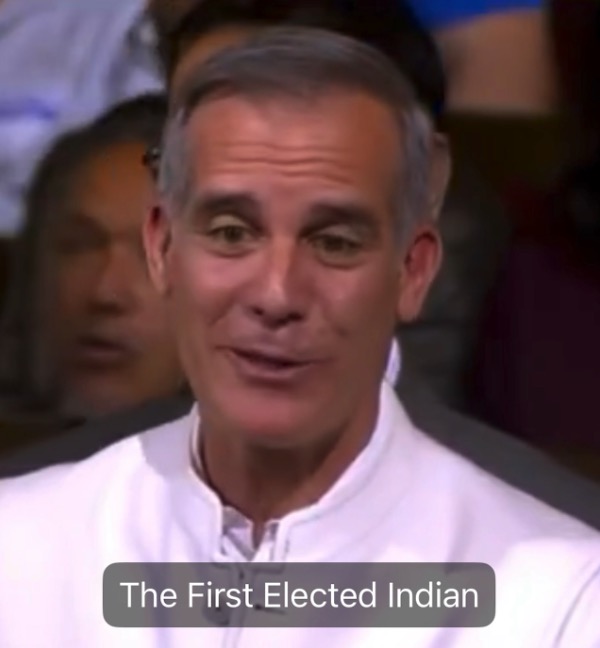
But the rustle of paper wrappers signaled the current herd adjusting their nameplates. At the picnic ground, ceremony is calories. The council gorges on donor-funded spreads and Diwali platitudes while dodging demands for accountability. Council President Marqueece Harris-Dawson pivoted from enlightenment to darkness: an ICE raid in Wilmington. Cue Councilmember Tim McOsker, the Harbor’s most enthusiastic foghorn.
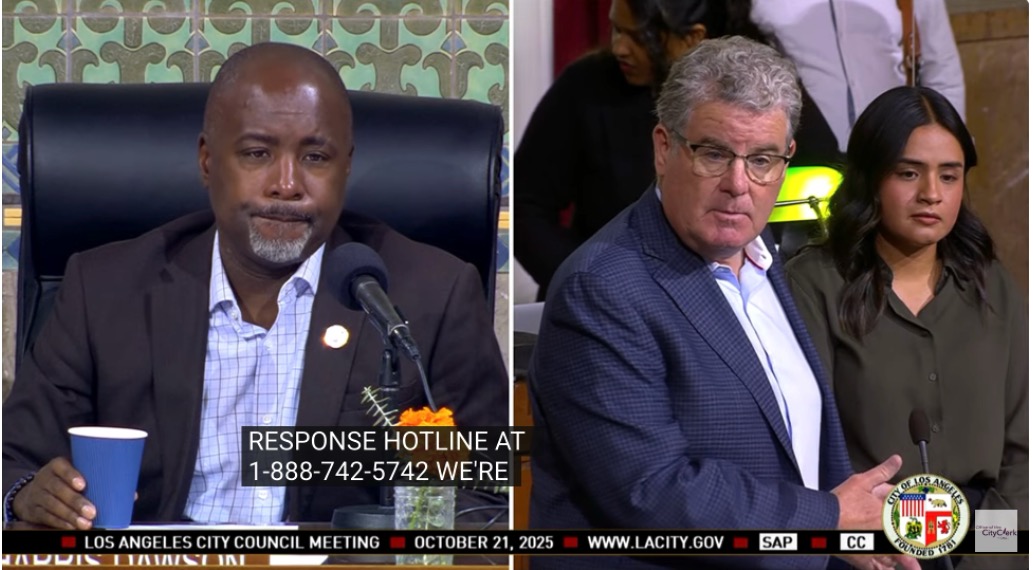
Council President Harris-Dawson jumping in frame with McOsker and Jenny Marin.
McOsker lumbered to the mic, solemn as a man who turns commas into soliloquies. “We are honored,” he began off-agenda, name-checking half of Los Angeles County before introducing Jenny Marín, whose father, Eloy, was detained by ICE while taking out the trash. Marín’s words cut through the theatrics: her father paid taxes, treated everyone kindly, and now sits in a cell “like an animal.” Her unfiltered pain silenced the room, earning applause the council absorbed as their own. Another segment for their highlight reel: Councilmember Reacts to Heartbreak (Season 11). The public gets fifteen seconds; the electeds get the camera.
This is democracy in Los Angeles now—the Temple of Democracy, as Garcetti once called it, rebranded as the Temple of Hypocrisy. Under his watch, public comment began its shrinkage, administered by Herb Wesson, sociopath emeritus with a gavel, who treated dissent like secondhand smoke. Raman’s Diwali drummers and Garcetti’s glow are just incense to cover the council’s allergy to sunlight. They celebrate light over darkness while filing settlements under “go forthwith.”
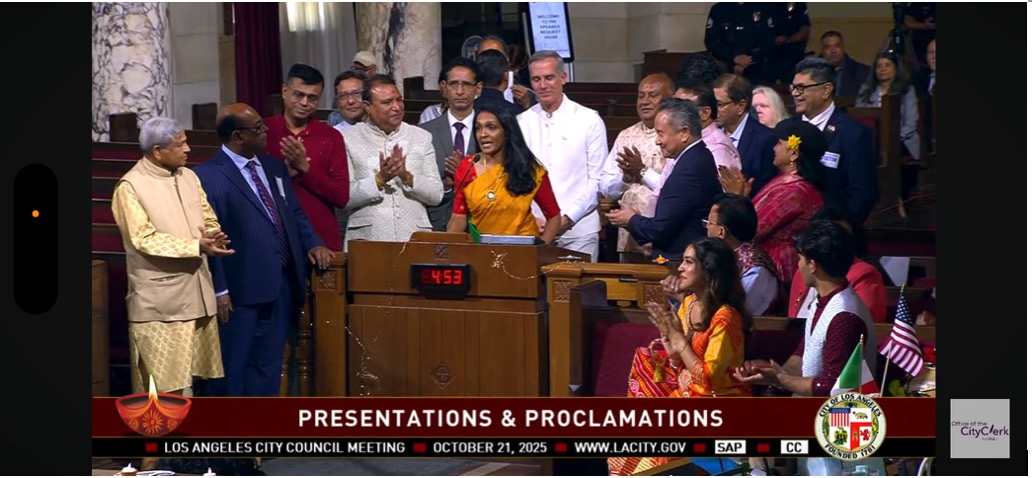
Outside the gates, the real creatures—gadflies, goons, raccoons, lemurs—sniff for scraps of accountability. They remember when speaking truth didn’t require a dial-in code, when a bear could dance and leave the sandwiches intact. Not anymore. The picnic basket marked Inside Safe? Gone. The thermos of public trust? Empty. Even the ants have unionized and can’t get through security. Garcetti’s half-smile, urbane and unruffled, once convinced a city that rhetoric was results. He’s not in Delhi now; he’s in Encino, close enough for applause, far enough to skip the clean-up. As Harris-Dawson dimmed the lights for closed session, the council congratulated itself for “shining light on injustice.” Outside, the sun did that for free.
Meanwhile, across the civic parking lot, the Board of Supervisors staged its own séance, lit by PowerPoint and panic.
Ten Ongoing Emergencies and One Big Embarrassment
The Los Angeles County Board of Supervisors convened Tuesday, October 21, 2025, for a three-hour slog through a bureaucratic marsh, with Chair Kathryn Barger steering like a flight attendant pointing to exits nobody plans to use. The agenda was a tired mix of platitudes, paperwork, and promises to fix what’s been broken since I was a Little Leaguer holding hands with Eunisses Hernandez, freaking out over Men’s Central Jail. Spoiler: we’re still waiting.
Item 1 — The Obligatory Warm-Up
Fifteen minutes of ceremonial fluff—maybe a proclamation, maybe a slideshow nobody watched. I was already fuming, having been bumped from the speaker queue. “I’m annoyed,” I told the Board later. “I’d like that minute back.”
Democracy’s foreplay is all tease, no follow-through.
Consent Calendar — Where Democracy Takes a Nap
A brisk shuffle through “receive and file” items and continuances. Buried in the supplemental agenda: a $16.5 million “outreach” contract to Mosaic Media, Modern Times Inc., and Santa Monica Mountains Fund, mislisted as a 401(c)(3) instead of a 501(c)(3). “That’s like $45 million in typos,” I scoffed during comment. Not funny.
When your outreach budget could fund a small nation, proofread the damn fine print.
Item 8 — The Safety Net’s Tattered
Edges A caller named Claudia (or maybe not Claudia) warned of an “attack on the safety net,” citing some 1970s book—Attack on Poverty or Attack on the Poor. A rare literary flex in a room allergic to books. I laid into the County’s “ten ongoing emergencies,” calling it “an embarrassment.” “If everything’s an emergency, nothing is,” I said, noting their plan to trim two from the pledge list. Meanwhile, a $500,000 Department of Mental Health party at a downtown hotel? “The optics aren’t great,” I told them, picturing champagne flutes while CalFresh outreach starves. Inflation, inequity, and perpetual crisis dominate every sentence not on the agenda.
Public Comment — The People’s Mic
Seventeen speakers turned the session into a three-ring circus of revelation and rebellion. Dignity & Power Now brought articulate fury, knowing every acronym better than the County’s staff. Justice LA tag-teamed against “care-washing” incarceration. A biker from Streets Are for Everyone and a foster-youth advocate rounded out the roster. I led the charge, still steamed about my stolen minute.
“You’re cancelling the November 12 meeting after Veterans Day? That’s lame,” I said. “I audited your Children and Family Services cluster meeting—confusion, an hour, and you call it transparency, Supervisors Mitchell and Horvath. Nobody in the room. No public. That’s cheesy.”
I gave a nod to new CEO Jeramy Gray for “staying away during most of today’s festivities” and to Horvath for “burning the bright, bright light when needed,” even if she was off on “some kind of unscheduled holiday choosing a home in the City of Los Angeles.” Where was Hahn? I tipped my hat to Sheriff Luna’s open-door policy but called out DA hopeful Nathan Hochman as “a talker, not a sweetheart.”
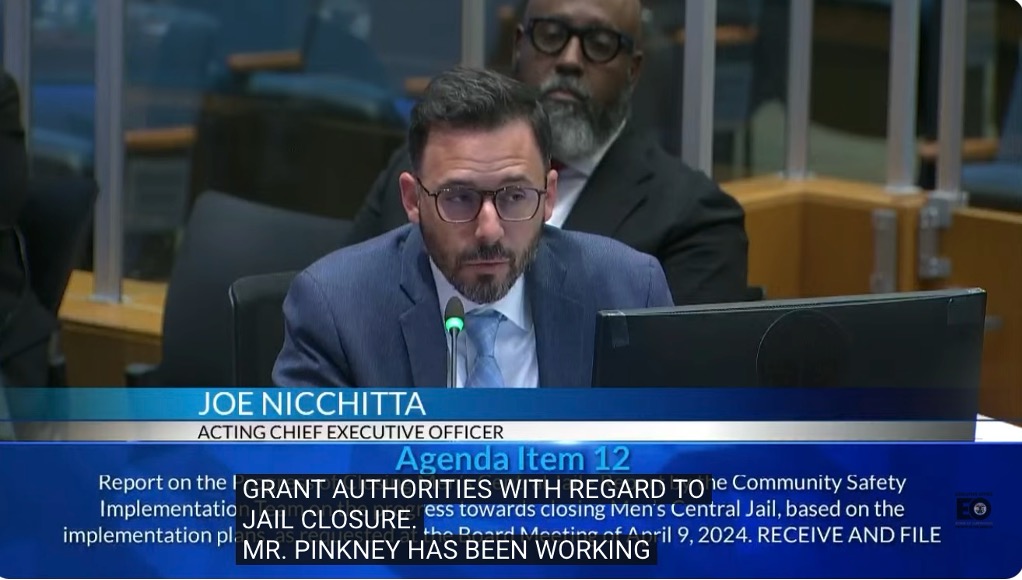
Acting CEO Jeramy Gray nods off in the background.
The justice system? “It doesn’t work very well,” I admitted, but small, community-based facilities are the fix, not fortress-like “care centers.”
Items 12 & 27 — The Jail Renovation Two-Step Sheriff Luna played department head on a tightrope: “We’re closing Men’s Central Jail without a replacement because that’s what you told us to do.” Barger looked horrified. “That’s not what we meant.” Horvath voted no; Solis and Mitchell nodded like they’d cracked utopia’s code. The talk ping-ponged between “care-first” slogans and the clank of $300 million in steel doors.
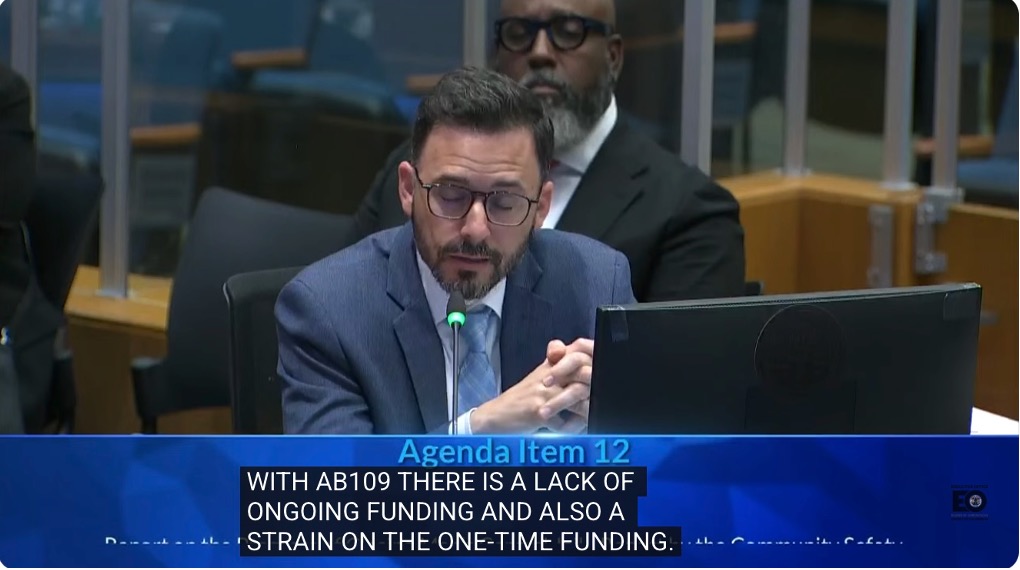
Joe Nicchita of CEO also nods off in solidarity. Public emergency #11 declared - 2 = 9!
I wasn’t having it. “When I was a Little Leaguer,” I told the Board, “closing Men’s Central Jail was the hot issue. Steve Lopez was banging his fist, and I was freaking out, holding hands with Eunisses Hernandez” (then an activist, now a city council leader). Twenty-five years later, Peter Eliasberg still kvetches but we haven't seen much progress. Do anyone miss Drooyan?
“You need smaller, community-based facilities,” I said, citing reform expert James Austin. “Not a giant deflavorizing mental-health facility. It’s nice to picture a big beautiful solution. Big is not always beautiful.” Families need connection to the community, not parking validation.
Motion passes 3–1. Reformers groan. Builders celebrate. Lawyers bill.
Los Numeros:
Meeting length: 3 hours 15 minutes.
Main topic: Jails disguised as “care centers.”
Emergencies still active: 10, “an embarrassment,” with two set to be trimmed.
Unmentioned outrage: A $500,000 DMH hotel party, optics be damned.
Public participation: 17 speakers, ≈70 minutes.
Supervisors visibly listening: 1.5 (on a generous day).
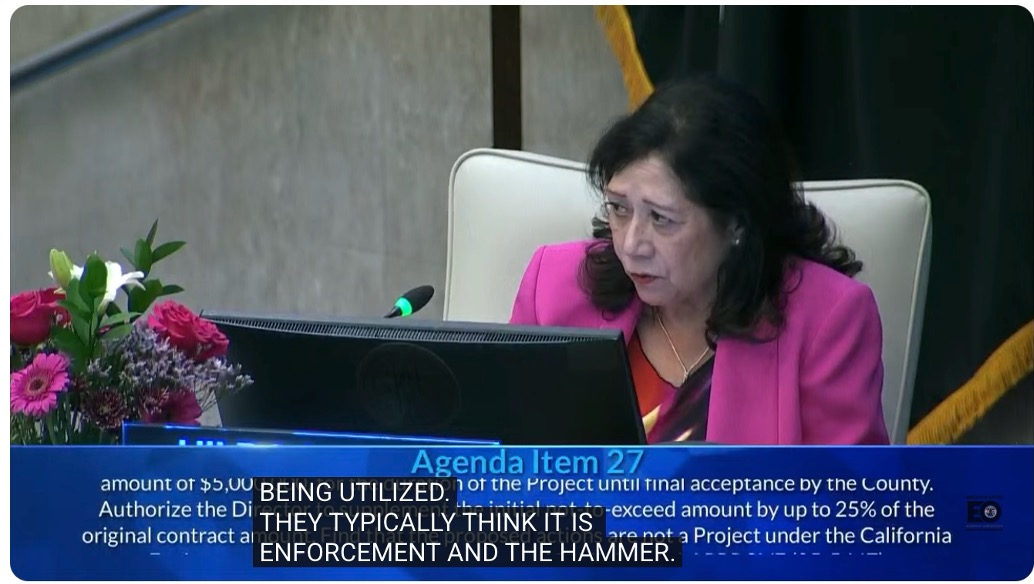
Supervisor Hilda Solis matches her bouquet.
Thought But Not Heard. Let’s talk about the Ocean Avenue fiasco in Santa Monica, where 49 people with behavioral health challenges were set to move into twocounty-run buildings. The neighbors, city, and mayor? Blindsided after hours. Supervisor Horvath claims she’s “disappointed by the lack of communication.” Disappointed? She’s not a bystander - she’s the Board, greenlighting the Department of Mental Health’s $3 billion budget and its opaque playbook: do first, disclose later. Horvath, three years in, helped write it. Cue her savior act: outrage, project pause, town hall promises. Rinse, repeat. She enables the chaos, scolds it publicly, then bows as the transparency hero—like an arsonist thanking the fire department. Santa Monica residents reel from a “bridge housing” project that feels like a midnight ambush with a “PRIVATE PROPERTY” sign. Nobody’s against helping the unhoused or those with mental health struggles. What’s exhausting is the hypocrisy—showy compassion from leaders who know how this happens yet feign surprise. Horvath’s “inexcusable” line is peak political theater. Want real transparency, Supervisor? Don’t just hold a meeting—show us the process. Who makes these calls? In whose name? Right now, the only ones left out are the people footing the bill.
Across downtown, the City prepared to prove the County doesn’t own the monopoly on make-believe.
Friday Double Feature
City Hall plans to roll out a double feature tomorrow—where transparency is a rare bird and the public is told not to feed it. At 10 a.m., the City Council gavels in with a Continuation agenda and recycled optimism. The real curiosity is the noon debut of the Budget and Finance Advisory Committee in Room 350 (Roybal Board of Public Works Session Room). This powerless “advisory” group—no Zoom, no budget, plenty of pedigree—features former City Controller Ron Galperin, former Central City Association, CEO Jessica Lall, and Gilda Haas of SAJE fame. They’ll elect a chair, adopt bylaws, and discuss a work plan while Councilmember Katy Yaroslavsky, the actual Budget Chair, plays host. It’s a mirror admiring itself.
In the Council chamber, Item 4—the CAO’s First Transportation-Related Construction Projects Report—is budget yoga: $11 million in transfers to keep concrete crews busy. Vision Zero gets $1.25 million in overtime to monitor a safety program going in reverse. Add scrubbed tunnels, poured curb ramps, and a “new” e-bike voucher—900 riders at $1,500 each, dodging the same old potholes.
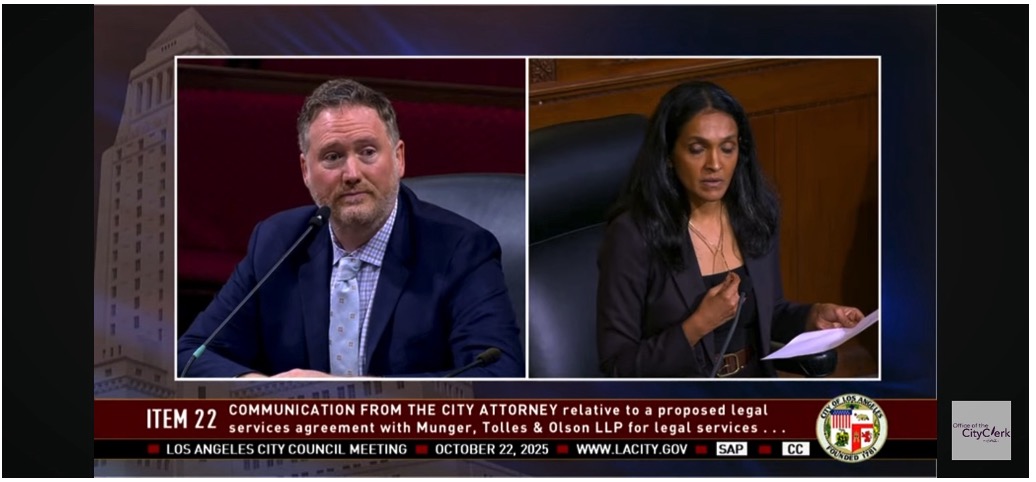
Mike Dundas of City Attorney always ready to collaborate with angry council transparently (in-closed session!)
Then there’s the Munger Tolles & Olson encore (on continuation)—a $750,000 contract to defend the City in the Palisades fire case while representing Southern California Edison, "rufkm, politely, no!" The waiver’s baked in. Yes, that Munger—Charlie Munger’s firm, which valued Marina del Rey leases, cushioned Assessor Noguez’s implosion, and hosted Zev Yaroslavsky’s “Citizens’ Commission on Jail Violence.” They’re back, billing taxpayers from both sides of the flame. Pack your thermos and moral compass: Council at 10, advisory fantasy at noon.
(Eric Preven is a Studio City-based television writer-producer, award-winning journalist, and longtime community activist. He is known for his sharp commentary on transparency and accountability in local government. Eric successfully brought and won two landmark open government cases in California, reinforcing the public’s right to know. A regular contributor to CityWatch, he combines investigative insight with grassroots advocacy to shine a light on civic issues across Los Angeles.)








